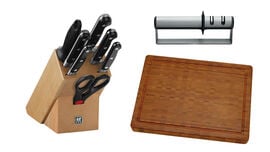CUTTING BOARDS
In order to cut food into portions, it must be cut with a knife. A cutting board can be used as a base for preparation. On the one hand, it protects the kitchen worktop from damage and, on the other hand, enables effortless cutting.
Material of the chopping board: wood or plastic
Cutting boards in the kitchen must be able to withstand sharp knives. Therefore the fundamental question of the material arises: wood or plastic. The use of wood or plastic as a cutting board is a personal preference. Both materials are suitable for cutting vegetables and meat. Cutting boards made of wood are no more unhygienic than a board made of plastic. Cutting boards made of glass or stone are not suitable as underlays, as these materials quickly dull the kitchen knives.
Cutting board made of wood - Natural look
Particularly high-quality are cutting board variants made of thermo beech, oiled beech, bamboo, and Hinoki. The latter is a Japanese cypress species, whose wood is unusually light, but still very resistant and durable.
It is not glued together but consists of a single piece. Due to the noble appearance of the wooden boards, they are also suitable as coasters for pots or pans at a table.
Cutting board made of plastic - quick and easy cleaning
Cutting boards made of plastic can be cleaned faster than boards made of wood. Plastic boards can even be cleaned in the dishwasher. They are also slightly less sensitive to discoloration and odors.
Care and cleaning of cutting boards
As mentioned, plastic kitchen boards are much easier to clean and can be washed in the dishwasher. A cutting board made of wood, on the other hand, requires somewhat more elaborate care so that it lasts long and does not lose its natural beauty. It must be oiled from time to time. Before you do this, you must wash it off as hot as possible so that the wood pores open and then let it dry completely. Apply the care oil in the direction of the grain and remove unnecessary residues with a kitchen roll. As soon as the care oil is completely absorbed, you can use the cutting bed again.














